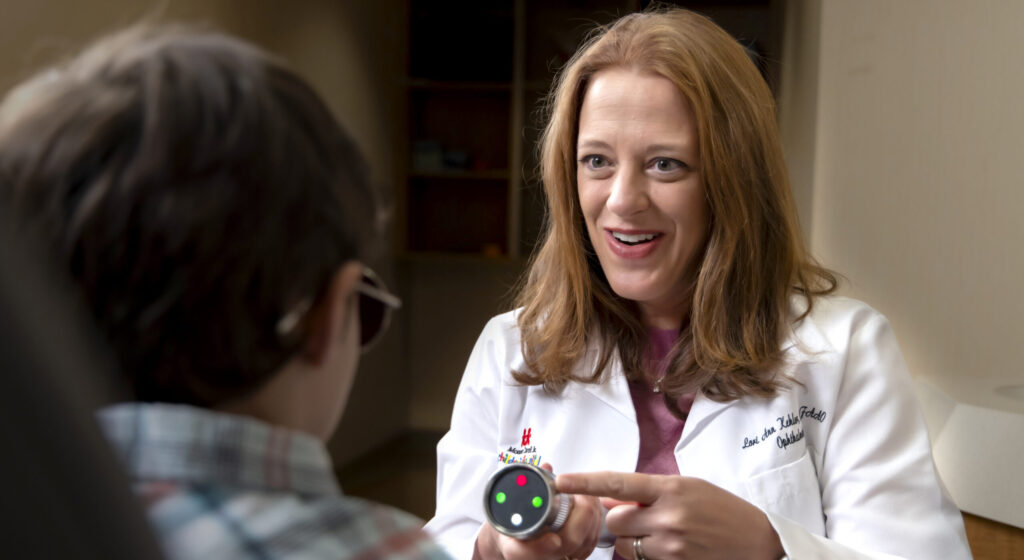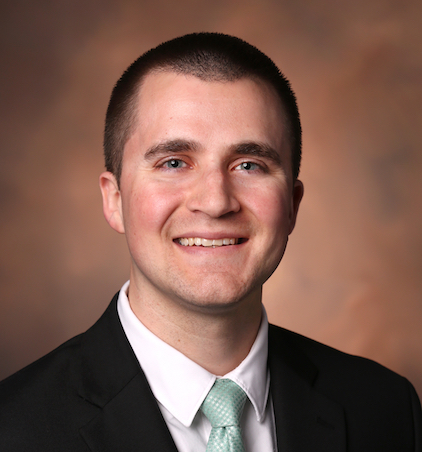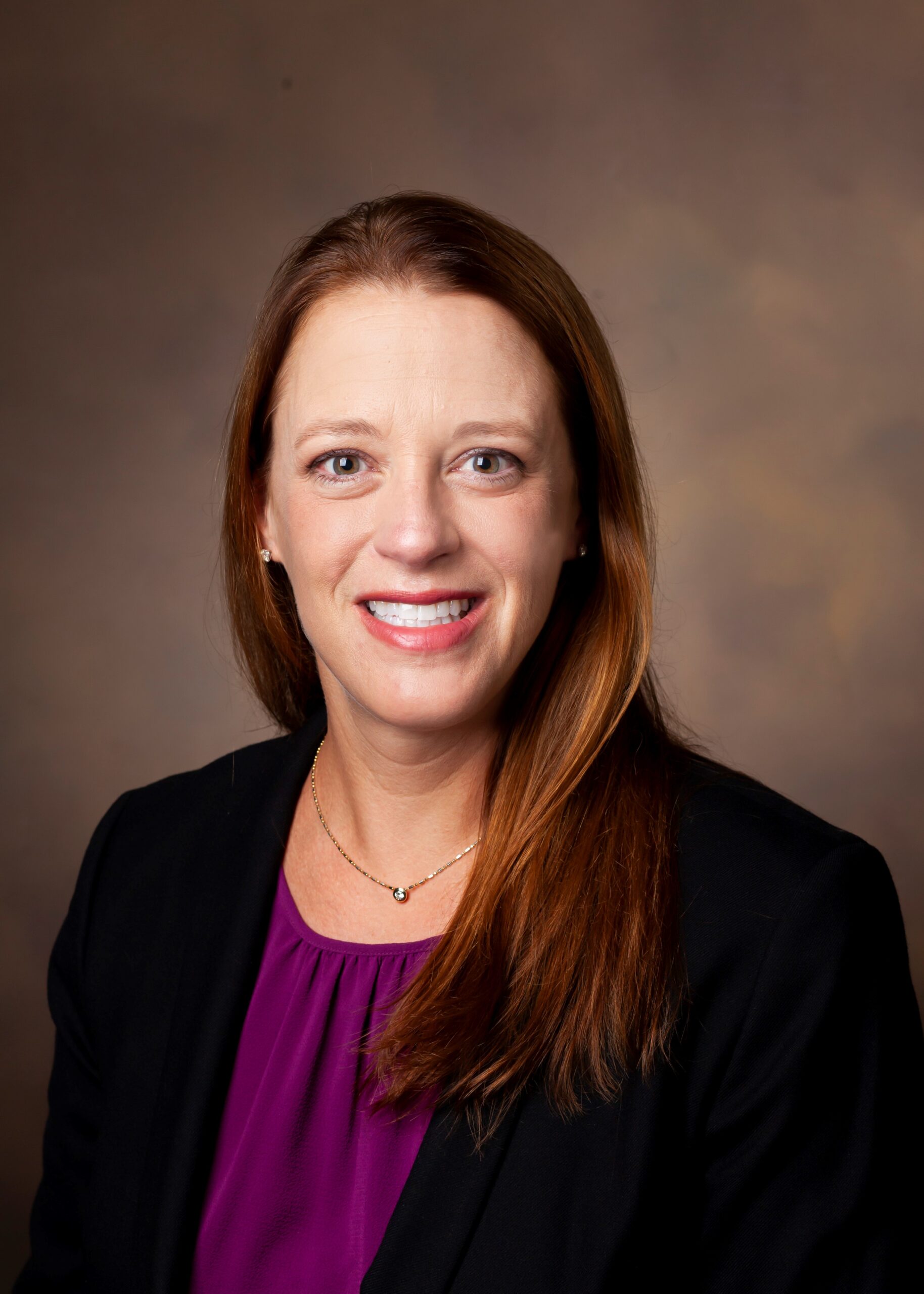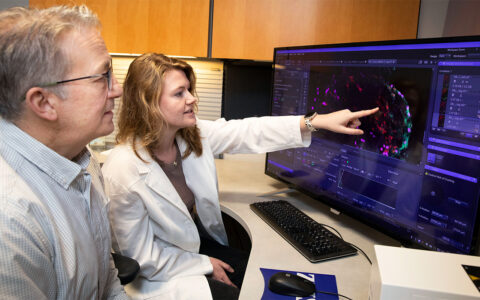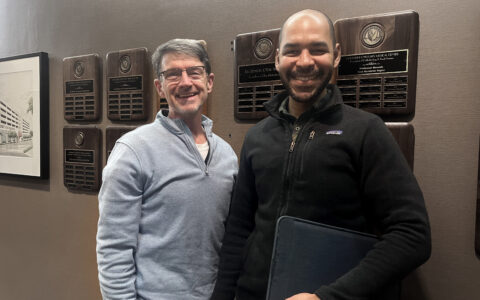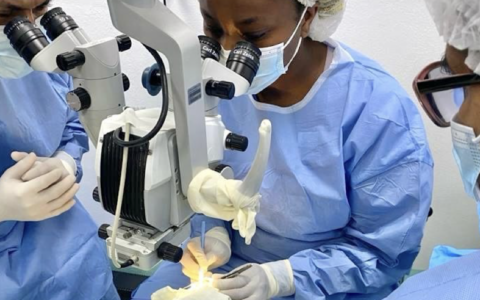Featured in the Vanderbilt Eye Institute Impact Report 2024. Peruse the rest of the Impact Report here.
The number of United States residents affected by low vision is expected to grow to 5 million by 2030 and more than 8 million by 2050, largely reflecting an aging population with degenerative diseases like glaucoma, diabetic retinopathy and macular degeneration.
However, low vision also impacts a significant number of children and teens.
To address a growing demand, the Vanderbilt Eye Institute (VEI) established a dedicated low vision clinic in 2018 that offers support to a diverse group of adults and children with medically irreversible vision loss.
“We see patients with low vision of varying degrees and from different etiologies,” said Josh Robinson, O.D., an assistant professor of clinical ophthalmology and director of the low vision clinic. “In a comprehensive manner, we’re developing personalized patient plans to serve the individual’s needs – from a kid in the first grade to a 95-year-old retiree.”
“In a comprehensive manner, we’re developing personalized patient plans to serve the individual’s needs – from a kid in the first grade to a 95-year-old retiree.”
Robinson sees the adults who come to the clinic through physician referrals.
“Those initial visits are lengthy – it takes a long time to get to know someone and figure out how much they understand about their situation,” he said. “It’s a functional discussion about how vision loss impacts their life and their ability to do what they want to do.
“Many of these adults have had normal vision and they’re still in some stage of grieving or denial. They have to be ready; our program won’t be productive until they are.”
It Takes a Village
Robinson and his team work closely with Vanderbilt and community providers, including home health and blind rehabilitation services, occupational therapy, and group and individual mental health support teams in Nashville and beyond. They also lead a robust online support group.
“Many of our patients come from outside the Nashville area,” Robinson said. “After we establish a plan, we attempt to find them resources closer to home. The support group helps many of them stay in touch with others experiencing the same challenges they are.”
VEI has now partnered with Vanderbilt Home Care Services and Salus University’s Blindness and Low Vision Studies Department to pilot a continuing education training course for Vanderbilt physical therapists in orientation and mobility.
Orientation and mobility (O&M) specialists provide assessment and instruction for individuals experiencing vision loss to support their goals of safe and independent travel in their environment. O&M specialists are often the first rehabilitation professionals to meet with someone diagnosed with low vision, said Mary Beth Swain, P.T., D.P.T., manager of rehabilitation services for Vanderbilt Home Care Services.
Swain’s therapists comprised the first cohort to complete the eight-week program, which was delivered as a combination of online and in-person sessions.
VEI board member Carlene Lebous, founder and CEO of vision rehabilitation facilities and an avid supporter of the program, envisioned the partnership as a way to address a lack of awareness about vision rehabilitation services nationwide.
“This collaborative effort between VEI and Salus University enhances the ability of physical therapists to support patients with vision loss within their scope of practice and to educate, screen and refer patients to specialized rehabilitation services,” Lebous said.
‘PAVEing’ the Way for School Success
Low vision is a significant barrier to learning and development in children, particularly for those whose schools lack the specialized devices and services they need to succeed. Since its inception nearly three decades ago, Project PAVE has provided low vision evaluations for thousands of school-age children across Tennessee, serving 120 students last year from kindergarten through high school.
Project PAVE is funded by the Tennessee Department of Education and the Tennessee Department of Disability and Aging.
“These students need considerable help in the classroom,” said Lori Ann Kehler, O.D., a pediatric optometrist at VEI and the program’s director. “With increased funding this past year, we were able to expand our reach and impact.”
Most Project PAVE participants are seen at the Tennessee Lions Eye Center at VEI, where they receive vision evaluations, access to visual assistive devices and instruction by Certified Teachers of Students with Visual Impairments (CTVI) – all at no cost to eligible families.
“Low vision has become a busy space, in a good way. The impact of our programs on the wellbeing of visually impaired individuals in Tennessee is incalculable.”
These specialized tools and services would be out of financial reach for some without the support of Project PAVE, Kehler said.
With program growth, she now visits West Tennessee and Chattanooga regularly for evaluations, contracts with another low vision specialist in Knoxville, and has increased the number of CTVIs from three to six teachers.
Robinson evaluates students at the Tennessee School for the Blind, and often sees teenagers with driving needs who may receive support from Project PAVE to become licensed drivers through use of bioptic telescopic devices.
“Bioptic devices are vision-enhancing systems paired with conventional eyeglasses that cost between $1,500 and $2,000, and they are rarely paid for by insurance,” Kehler noted.
Project PAVE provides the device. VEI partners with Pi Beta Phi Rehabilitation Institute for training, which can take six to 12 months.
A cortical vision impairment clinic partially funded by Project PAVE is another addition unique to VEI.
“Low vision has become a busy space, in a good way,” Kehler said. “The impact of our programs on the wellbeing of visually impaired individuals in Tennessee is incalculable.”

